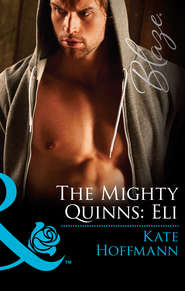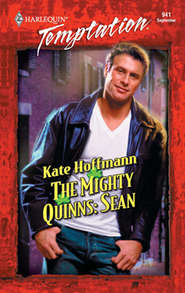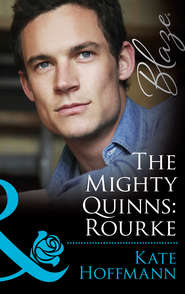По всем вопросам обращайтесь на: info@litportal.ru
(©) 2003-2025.
✖
The Mighty Quinns: Dermot-Dex
Автор
Год написания книги
2019
Настройки чтения
Размер шрифта
Высота строк
Поля
“I guess it wouldn’t be that much different than goats,” Rachel said.
Dermot couldn’t help but laugh. “Really?”
“You know what I mean. Goats can be very mischievous. And they never listen to what you say. And when they get sick they can’t tell you what’s wrong with them, you’re just left guessing. And you spend a lot of time cleaning up after them.”
“Goats are exactly like children,” Dermot teased. “And husbands are exactly like donkeys and wives are exactly like chickens.”
“You have that right,” Rachel said with a nod. She set off across the field.
Dermot caught up to her and grabbed her hand. “So that’s your opinion of marriage?”
“I have no opinion of marriage,” Rachel said. “I think it can be harmful to develop an opinion of marriage before you’ve actually had a proposal. If that ever happens, then I figure I’ll decide what I think.” She gave him a sideways glance. “Do you have an opinion you’d like to share?”
Dermot frowned. Considering her opinion, or nonopinion, maybe it was best that he kept his to himself. “No,” he said. “I haven’t thought much about it.”
“It’s a big risk,” she said. “A leap of faith. I mean, my parents were married for forty-five years. How did they know that they weren’t going to get bored with each other after ten or fifteen years. I buy a sofa that I love one day, and two months later, I think it’s the ugliest sofa on the planet.”
“Now men are no longer donkeys, they’re sofas?”
“I’m just throwing out some analogies,” she said.
“You’re lucky you’re such a good artist, because you suck at analogies,” Dermot said.
Rachel giggled. “All right. Maybe I do. But the thought of mating for life is kind of scary. It’s a long, long time.”
“Penguins mate for life,” he said. “I saw that on Nat. Geo.”
“Eagles do, too. And geese. And swans.”
They walked the rest of the way in silence, Dermot considering her comments. He’d never met someone he could imagine marrying, until now. In truth, he’d spent more time with Rachel than he had with any other woman in his life. Every day for almost six weeks. Almost every night, too. They were as close to married as he’d ever been and he hadn’t thought once about running.
He raked his hand through his hair, stunned by the realization. In the past, he rarely continued a relationship after a few months. He grew bored and she grew clingy or they both were too busy to pursue anything further. But with Rachel, he’d stepped into her life one day and hadn’t thought about leaving.
Five weeks together and he still looked forward to waking up with her beside him in the morning and falling asleep wrapped in her arms at night.
They reached the creek and Rachel sat down on a grassy spot near the bank. It was the kind of perfect scene that he would remember for a lifetime, the sun gleaming off the wet rocks, milkweed seeds floating on the air, and a sky so blue it hurt to look at it. And then there was Rachel, her pale hair caught up in a haphazard knot and her face flushed from the heat.
Dermot wandered to the edge of the water and picked up a wildflower from a clump on the creek bank. He’d grown so comfortable here on the farm and he tried to imagine Rachel in his environment. Could she ever feel the same way about Seattle?
As much as he tried, he couldn’t seem to make the image jell in his mind. This was exactly where she belonged, in this place, on this farm. Dermot turned and looked at her, her gaze fixed somewhere on the horizon.
He’d never expected these choices to be easy. But then, he’d never expected them to be excruciatingly painful either. Once he fell in love, he’d just assumed it would all work out exactly as he wanted. He had a week left on the farm before he’d head home. She’d stay here forever, as she was always meant to.
There was only one thing he knew for certain. He’d have to learn to deal with the loss or spend the rest of his life wondering what might have been.
THE TOWN OF LAKE GENEVA was the closest thing to a tourist trap that could be found in the county. Known for its quaint shops, pretty streets and gleaming lake, Rachel usually made the short drive every few months to treat herself to a haircut or manicure.
Today she had Dermot, Trevor and Taylor for company. They’d stopped first at a discount store and picked up the list of school supplies she’d downloaded from the high school website, reassuring the boys that they would be ready when Monday rolled around.
After that, they’d enjoyed a leisurely lunch at a local hamburger joint, the boys inhaling their meal between one-word answers to Dermot’s and Rachel’s questions. Though they were feeling more comfortable at the farm, taking them out of that environment made her nephews a bit uneasy. And any discussion of school sent them both into a silent funk.
“Hey, there’s a movie theater a few blocks from here,” Rachel said. “Why don’t we check what’s on and if you guys want to see a movie, Dermot and I will do some more shopping.”
“Yeah,” Trevor said with a wide smile.
“What if I want to see the movie instead of going shopping with you?” Dermot asked.
That caused a laugh from Taylor. “Uh-oh,” he murmured.
“I—I guess that would be all right,” Rachel said. “I just thought you’d want to—” She forced a smile. “Never mind. I can shop on my own. I do it all the time.”
Dermot grinned as he reached out and grabbed her hand. “I’m just teasing. Of course I’d love to go shopping with you, Aunt Rachel. It’s my favorite thing to do in the whole world.” Dermot rolled his eyes dramatically and Rachel threw a crumpled napkin at his face.
This caused the boys to dissolve into laughter, Dermot egging them on with silly faces. At heart, they were all just little boys, so easily amused. “Maybe I don’t want you to come now,” Rachel said.
“Aww,” they all groaned in unison.
“I’m not sure I like this. Three against one.” She stood up and grabbed the check. “Come on, let’s get out of here. We don’t want to be late for the movies.”
In the end, the two boys decided to see the latest sci-fi action hit while Dermot was happy to accompany Rachel. They headed for her favorite antiques store, a small shop just off Main Street with wide plate-glass windows and an old-fashioned center entrance.
Dermot held open the door and ushered her inside. Rachel walked right to the counter. Sylvia, the elderly woman who owned the store, was working behind the register. “Rachel. I didn’t expect you to come in so soon. I just called on Friday.”
“I was in town. And I wanted to see what you had.”
“Come in back and I’ll put it out over a table. It’s really quite beautiful. One of the nicest I’ve seen.”
Rachel had been buying antique quilts from Sylvia for almost a year, her only indulgence in a very strict budget. But her passion for collecting quilts had come from her mother. As a child, Rachel had accompanied her mother to auctions at least once a month in search of the hand-stitched creations.
Her first quilts had come from her grandmother, beautiful hand-pieced bedspreads made of faded calico fabrics. Then she’d inherited her mother’s eclectic collection. And now she was adding quilts of her own.
Sylvia pulled the quilt from a bag and threw it over an antique dining table. She patted Rachel’s shoulder. “I’ll give you some time to enjoy it.”
Rachel sighed. “Thank you, Sylvia.”
Dermot stood by her side. “It’s a quilt.”
“It’s a piece of American folk art,” she said, smoothing her hands over the fabric. “It tells a story. All of these fabrics came from old clothing the family had worn. I use pencils and ink and they used old aprons and shirts and dresses. And the pattern represents the maker. And each region of the country has favorite patterns. The women worked together on the quilting. See these tiny little hand stitches? And the designs they make? It’s beautiful.” She stepped back and pointed to the price tag. “Tell me how much it is. I’m afraid to look.”
Dermot glanced at the tag. “Four hundred,” he said.
“I never pay more than three hundred.” She shook her head. “I can’t afford this one.”
“But you want it.”
“I can’t have everything I want,” Rachel said. “I have the farm and now the boys. There are just better ways to spend my money.” Rachel shrugged. “Another one will come along.”
“But you love this one,” he said. “You should have this one.”











